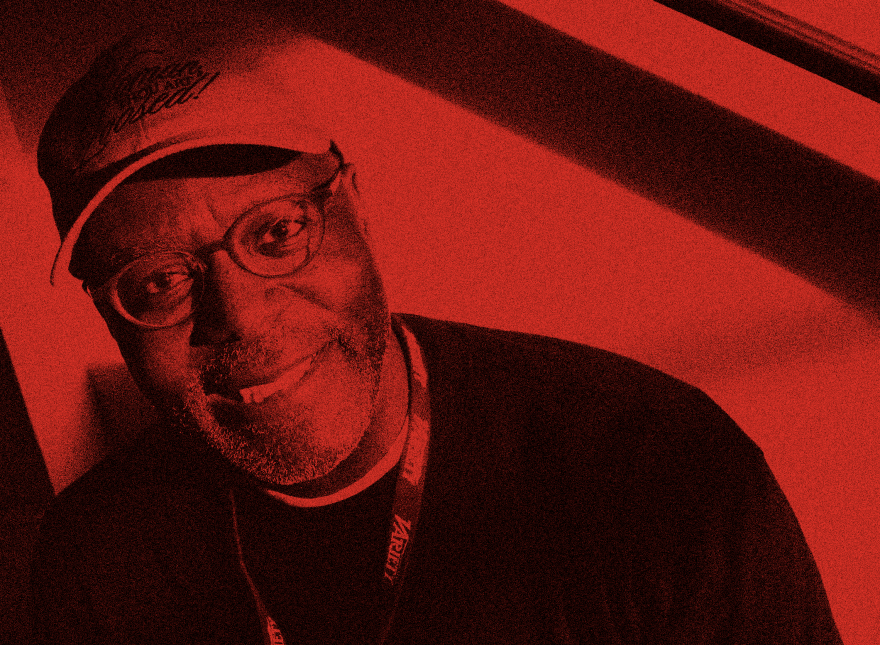How The First Black Casting Director Got His Start In Hollywood

While you may not know casting director/film and TV producer Reuben Cannon by name (yet), it’s very likely you’re familiar with his work. Over the course of his career, Cannon cast TV shows like Moonlighting and Sanford and Son, films including The Color Purple, What’s Love Got to Do With It, Who Framed Roger Rabbit and several of director John Carpenter's horror movies. His production credits include many of Tyler Perry’s TV shows and films and Spike Lee’s 1996 movie Get on the Bus.
He also made Hollywood history, by becoming the first Black casting director in the 1970s. Cannon got his start in the mailroom at Universal Studios, worked his way up to a job as a casting department trainee, then a casting director, moved to Warner Brothers to take a position as head of television casting, and then opened his own casting office in 1978.
In the latest season of The Academy Museum Podcast, Cannon spoke with host (and Academy Museum director and president) Jacqueline Stewart about getting his start in casting, what it was like to be the “first” in the industry, and why he ultimately decided to leave casting in favor of producing.
These interview excerpts have been edited for length and clarity.
Getting in the door
-
Let's take an easy stroll around Atwater Village
-
The resort has found a new buyer
-
A new addiction treatment facility is open
Jacqueline Stewart: So I want to talk about how you got started in the industry …
Reuben Cannon: I tell the story that everything I needed to know about my job at Universal Studios, as a mail person or part of the Universal Studio's Training Program, I learned in Chicago on my paper route. 'Cause there are three fundamentals when you're delivering newspapers in Chicago. One is: Deliver papers every day without fail. No excuses, no matter the weather. Number two: Get to know your customers, because if you don't get to know your customers, you will not be able to collect the money that you’re owed. And number three: Most important, don't get robbed.
So how do those basic elements apply to Hollywood? Well, I was hired at Universal Studios to work in the mail room and deliver the mail every day without excuses. Get to know your customers. Even though your customers are Alfred Hitchcock and Paul Newman and Lew Wasserman, you still get to know them and because you're gonna need a reference at some point to move out of the mailroom. And number three, don't let anyone rob you of your dreams.
So let's talk about that transition that you made from Chicago to Los Angeles. What was L.A. like when you got out here?
Well, in 1970, ‘71, it was right after the Watts riots, so the place was teeming with a certain degree of, you can say consciousness. But I don't know if it was consciousness, so much as it was an effort on L.A. to try to right itself, to create more, now we call diversity, and more inclusiveness. There was an effort for that and I think that probably led to perhaps my being hired in the mail room.
So you're at Universal, and while you were there, were there mentors you had or how did it work in terms of giving you an orientation to the industry?
There weren't many. There was an older gentleman who worked in the custodial department — Willie. And Willie, while he was basically a janitor, he had such wisdom and he'd been paying attention and, you know, he went back to the W.C. Fields days. And having him tell me stories about the various factions on the studio lot, who to look out for, it really was right out of the African diaspora tradition of sharing knowledge and wisdom.
So, if there was a mentor in that way, it was Willie. But there were also very few brothers there, very few Black folks. There was a guy in personnel, Jim Harris, who was the one who hired me. And to give you a history of how I was hired, my uncles had given me a strategy for how to get a job that had never failed me in Chicago.
And that is, if you go to the place that you wish to be hired the day after payday, and introduce yourself to the person that's gonna hire you. Because he's gonna, inevitably, and these are blue-collar jobs, he's gonna be short. 'Cause someone would've gone out the night before and partied, and you're there.
I got my job as a busboy at a restaurant that way, I got my job once as a steel mill for the summer that way. So I thought, I'm gonna try that strategy here at Universal Studios. So I'm talking to Jim Harris in personnel and after I fill out my application I said, "Mr. Harris. You mind telling me what day do people get paid here?" And he looked at me like, "You know, you don't even have a job. You want to know about payday?" And he says, "Well, we have different unions and different guilds here, so every day people are being paid here." I said, "OK, I'll be here every day." And I was.
So I rode the bus from Crenshaw and Adams every day and sat in the reception area of the personnel department at Universal and waited for someone not to show up. I didn't care what department it was. Get me on the lot, I'll find my way. So by mid-December, I said I need to break this up. So let me spend half my day at Warner Brothers, and the other half of my day at Universal, and I'm down to $28. And it's the day before New Year's Eve. So Jim Harris sticks his head out of the door and says "Reuben, there are two mailroom employees that are stuck up at Big Bear. They went skiing. They can't get back in time to bag the mail. Can you help us out?"
And that temporary position turned into a full-time position. The mail room was the recruitment center — the first place that the studio would look when they were looking to add staff. And so there was a posting for a casting department trainee. And I'd spent time in the theater working with actors. That was what first got me interested in entertainment and the magic of creating and expressing through the arts. So I applied for the position along with two other fellow mail boys.
So those are the three resumes that were sitting on the desk of the head of the casting department, Ralph Winters. And it comes back to the story about "get to know your customers." I had met Ralph delivering mail because in the mail room, you deliver mail to the entire lot. And it really goes to show you how one person can impact the entire industry.
So Ralph Winter said, "Reuben, I've seen you here delivering mail. Everyone in the office here seems to like you. If I had career ambitions, I'd have to hire one of the other two gentlemen, because of their connections, their letters of recommendation are from very influential people in the industry. But on paper, you're more qualified because of your background. But because I'm gonna retire in three years, I have the luxury of doing what's right and what's fair."
And so he hired me. I became the first Black casting trainee, and then became Universal's top casting director.
Being the first
So for quite a long time, you were the only Black casting director in Hollywood. And I wonder how you felt about that. I mean, you made it clear that there were others you wanted to bring in, but during that period, was this pointed out to you a lot?
Well, it was obvious. And it just spoke, to me, to the historical racism of Hollywood. But I also knew that it was a trial. I was a test balloon. If I messed this up, who knows how long it would be before another one? So there was that weight, there was the cultural pressure, as well as the industry pressure.
So I was very mindful [of that] and fortunately, you know, having grown up in Chicago, I just knew how to compartmentalize my life in a way that I could focus. And my world was pretty much locked into focusing on making sure I became the most knowledgeable person in the room about actors on TV, and two plays a week, and two films a week. So I had a pretty steady diet built around just gaining knowledge about talent.
Were there moments where you really faced explicit forms of discrimination? Or more subtle microaggressions?
More, I guess you would call microaggressions. People — there would be a shock because once again, the history of racism, the assumption that you go and audition, they'd never seen a Black casting director before. So then the agent would send him out to audition and the agents, I don't think, said to them, "You're gonna meet Reuben Cannon, and he's Black." I don't think they made that add-on. So the actor would come in, and they might have been thrown, you know, to see, and some would actually say, "I didn't know you were Black." I guess the name Reuben could imply other possibilities. And I said, "Is it a problem?" [And they’d say] "Oh, no, no, no, no, no."
Although there was one guy who said, "I have a problem with that." He was a devout racist and he said he didn’t want to read. So I called his agent up, and I think his agent might have dropped him after that.
What was the reaction of Black actors?
Well, they were overjoyed, but it was — they were overjoyed, but then they expected me to absolutely just flood Universal Studios with, you know —
With the hookup.
Totally, totally.
You know, I was casting a pilot once: “Lazarus Syndrome.” And the usual suspects were on the list. Former TV series stars. But I knew that Lou Gossett was looking for a series and I, of course, to myself, [thought] "When do I bring his name up? Do I bring it up in the beginning or do I bring it up after all these other guys say no?"
So that's just even that type of, you know, thinking in terms of when it's gonna be best received. I decided not to put his name on the list in the beginning, but let's get three turndowns. So we got three turndowns. And I say, "You know, there's a great way to do this show with an actor who has great marquee, great skill, in Lou Gossett." And [writer] Bill Blinn and [director] Jerry Thorpe, they loved the idea. But I'm sure if I had not been there, that wouldn't have happened.
The ‘Ray Charles moment’
Let's talk about your auditioning process. How do you approach it?
I would first try to engage actors in conversation and make them feel comfortable. 'Cause I know the anxiety that surrounds the audition, and so I find out more about them. The part I enjoyed most about casting was just finding out about the actors' personal lives.
So I would try to create a comfortable environment 'cause I want them to do the best work. I mean, I wanna get the job done so I can move on to my next project. I'm not looking to delay the process.
There's a metaphor I use, what I call the “Ray Charles syndrome.” When Ray Charles sings “America the Beautiful,” a song you've heard all your life, it's like hearing it for the first time. Same with dialogue. When you’re auditioning, you hear the dialogue read by any number of actors, but someone will come in and say those words and it's like Ray Charles singing “America the Beautiful.” You will hear it for the first time in a new way. And that's what I would look for. I would look for that Ray Charles moment.
And when it happens, it's just — you know, the room changes, the air in the room changes.
Leaving the casting for producing
I want to talk about your transition to producing. Why did you make that decision? What was it that made you wanna go into that side of the industry?
The thing is, casting directors are almost the unheralded heroes of the whole filmmaking process.
You know, it really annoys me when people accept their awards, they thank the incredible cast. Well, who put that cast there? I mean, you hear it over and over again. "I owe to the — to my cast." Well, where'd that cast come from? Did they just walk in off the street? They should be acknowledged.
Why do you think it's underappreciated and under-acknowledged?
Because once the work is done, the focus then goes on the actor. You know, it's almost like your work is done in the shadows. Once it's completed — it's like the home you're living in, you know, you don't give the architect credit. So the architect of the movie, from a casting perspective, is just not acknowledged. The work is done and you move on.
So that was part of it, the lack of appreciation for the craft and the work that goes into it. But also the, just the financial — you know, that you put that work in and the work lives on, but you don't get any ongoing residuals.
So whenever I would work on a movie with a producer, I would say, "Look, I'm the casting director, but I’m also a student. My aspiration is to produce films." And they would welcome that. So I would be there on days when my work was done, and I would still go to set and observe.
The first opportunity came [when] I was casting for [film producer] Bill Borden. Bill Borden called me and said, "Reuben, we have a project that we'd like for you to direct." I said, you know, "I really don't have — I'd rather be the kingmaker, not necessarily the king. But what's the project?" He says, "The Million Man March. What if we were to do a movie about a group of men that embark on a bus from Los Angeles as strangers and form relationships and friendships before they get to Washington?"
I said, "I like that. I like it because there's a chance to show diversity among Black men. But it's not for me to direct. Let me call Spike [Lee] and see if he might be interested." So I called and pitched the idea to Spike. Spike says, "What are they gonna be doing? They gonna be singing on the bus?"
I said, "No, it's not a musical, it's a road trip." I said, "Look, I think it's a great movie, we could put together a group of wonderful actors." And then he came around. He says, "You know what, you’re right. But let's do it this way. If we're gonna do it in the spirit of the march, it should be financed by Black men. And why don't you, you’re in Hollywood, you take the actors, I'll take the athletes, OK?"
So if you see the movie it says “15 Black Men Productions.” The movie was financed by 15 Black men — the first time in the history of Hollywood a movie’s ever been financed totally by Black men. The initial investment was from myself, Spike and screenwriter Reggie Bythewood. And the four actors that were investors were Wesley Snipes, Danny Glover, Robert Guillaume and Will Smith.
And we made the movie [Get on the Bus]. It holds up and it's one of my favorites 'cause it accomplished what we talked about in terms of diversity. And the issues that are discussed are still in the forefront of conversations.
Listen
How do I find The Academy Museum Podcast?
It's now available from LAist Studios — check it out wherever you get your podcasts! Or listen to the episode with Reuben Cannon on the player above.
-
A new trend in travel focuses on disconnecting from modern life and reconnecting with oneself in nature. It's called a "quiet vacation."
-
Samy Kamienowicz, the man who founded the retail camera stores and became a fixture for the city's creative community, has died. Los Angeles pays tribute.
-
The music will live on through the nonprofit Conga Kids.
-
Known for its elaborate light displays, this year, the neighborhood is expecting a bigger crowd tied to the release of “Candy Cane Lane” on Amazon Prime Video.
-
Dancers at Star Garden demanded better working conditions — including protection from aggressive guests. Up next: An actual contract.
-
The Alliance of Motion Picture and Television Producers rejected the SAG-AFTRA union's request for a separate type of residual payment that actors would get once their programs hit streaming services.






